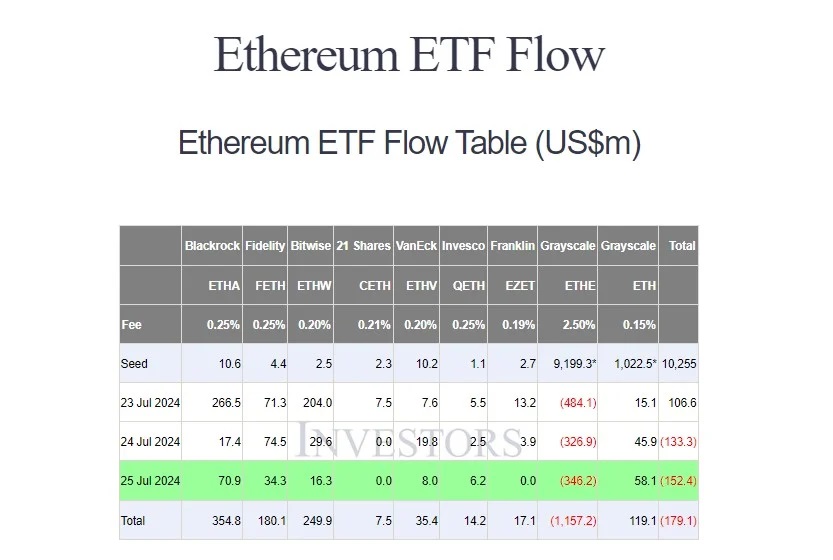In contrast, the spinoff from Grayscale's Ethereum Trust has seen its net inflows consistently grow over the last three days.
Grayscale’s Ethereum ETF (ETHE) ended Thursday with approximately $346 million in net outflows, extending its losses to $1.1 billion within three trading days since its conversion, data from Farside Investors reveals. After the third trading day, ETHE’s assets under management plummeted from over $9 billion to $7.4 billion, a remarkable decline since the launch of US spot Ethereum ETFs.

In contrast, BlackRock’s iShares Ethereum Trust (ETHA) led inflows on Thursday, attracting approximately $71 million. Grayscale’s Ethereum Mini Trust (ETH), a spinoff of Grayscale’s Ethereum Trust, followed with over $58 million in net inflows.
Other funds, including Fidelity’s Ethereum Fund (FETH), Bitwise’s Ethereum ETF (ETHW), VanEck’s Ethereum ETF (ETHV), and Invesco/Galaxy’s Ethereum ETF (QETH), also reported inflows. The remaining ETFs saw zero flows.
Despite inflows to eight Ethereum ETFs, the combined net outflow for all nine funds on Wednesday reached $152 million, the largest since their trading debut on July 23. This outflow was largely driven by Grayscale’s ETHE.
ETHE’s 2.5% fee makes it a considerably expensive option for investors who are looking to get exposure to Ethereum. Investors have been selling their ETHE shares and moving to lower-fee newcomers.
The situation is not entirely unexpected given the experience of Grayscale’s Bitcoin ETF (GBTC). The fund’s outflows topped $5 billion after the first trading month, according to data from Bloomberg.
However, this time, Grayscale’s Ethereum Mini Trust could help it get rid of the deja vu. ETH’s 0.15% fee makes it one of the lowest-cost spot Ethereum funds in the US market, and the fund’s inflows have consistently grown since it was converted into an ETF.
 cryptobriefing.com
cryptobriefing.com
